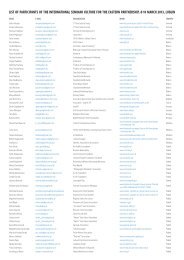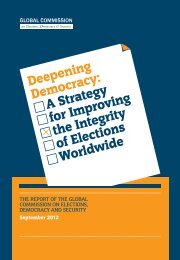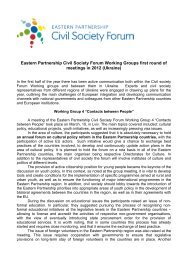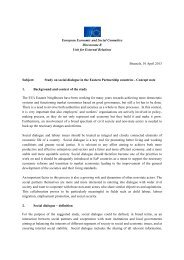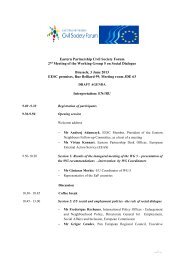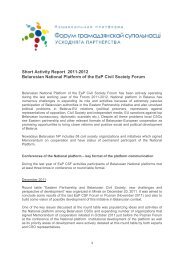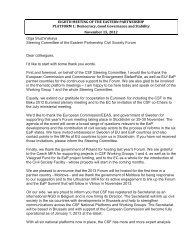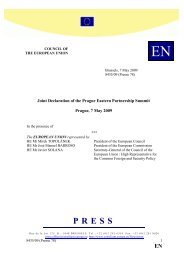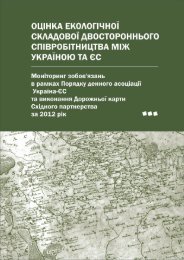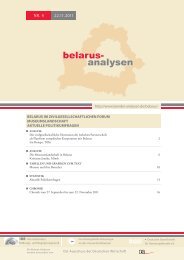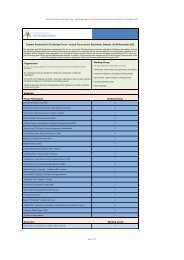Non-formal education - Eastern Partnership Civil Society Forum
Non-formal education - Eastern Partnership Civil Society Forum
Non-formal education - Eastern Partnership Civil Society Forum
Create successful ePaper yourself
Turn your PDF publications into a flip-book with our unique Google optimized e-Paper software.
System in Armenia<br />
Education has always been of utmost importance for human development, economic and social<br />
progress. Currently, the process of economic and social change, not only in Armenia, but the world is<br />
much faster, which is why special importance is given to the opportunities and access for citizens to get<br />
an <strong>education</strong> and be trained at any age. As a result, a citizen, as a leading society forward power and<br />
a factor of social integration within the country and in the international community, must be required<br />
periodic acquisition and improvement of modern labor skills and core abilities, the range is constantly<br />
expanding.<br />
With <strong>formal</strong> <strong>education</strong> community can provide its citizens forming a part of them, which is obviously<br />
not enough for the harmonious development of the personality and competitiveness in the labor<br />
market. Institutions of civil society (social, socio-political organizations and associations, international<br />
organizations, etc.) are trying to fill gaps in the system of <strong>formal</strong> <strong>education</strong>.<br />
The main objective of the strategy in the field of complementary and extended <strong>education</strong> is the<br />
definition of basic principles of fairness of permanent <strong>education</strong> for all in Armenia and mechanisms<br />
for organizing, implementing, managing, financing and quality assurance that will be the basis of legal<br />
regulation and implementation.<br />
In this case, the basic laws in RA are the following regulations: 1. RA legislation in the field of<br />
<strong>education</strong>; 2. “The strategy of the initial (vocational) and secondary <strong>education</strong> and training in the<br />
Republic of Armenia”, approved by the government in 2004; 3. “The strategy and the concept of adult<br />
<strong>education</strong>”, approved by the government in 2005; 4. “The concept of non-<strong>formal</strong> <strong>education</strong> in the<br />
Republic of Armenia”, approved by the government in 2006; 5. “The concept of lifelong learning in the<br />
Republic of Armenia”, approved by the government in 2009; 6. The “National Report on the additional<br />
and continuous <strong>education</strong> in the Republic of Armenia” (2011); 7.The conclusions of the Lisbon and<br />
Stockholm communiqué (Lisbon and Stockholm Communications, March, 2000); 8.Memorandum of<br />
continuous training (A Memorandum on Lifelong Learning, Commission Staff Working Paper, Brussels,<br />
30.10.2000).<br />
Approved by the Government of the RA concept of non-<strong>formal</strong> <strong>education</strong> clarifies the basic concepts<br />
and features of non-<strong>formal</strong> <strong>education</strong>. In particular, the statement of the Government of the Republic<br />
of Armenia meeting N 50, dated December 14, 2006 to approve the concept of non-<strong>formal</strong> <strong>education</strong><br />
in RA in general is a guiding document officially recognizing and defining the guidelines for the further<br />
development of non-<strong>formal</strong> <strong>education</strong> in the Republic of Armenia.<br />
The provisions consistent with the concept of sustainable development were also enshrined in<br />
the “National Report on the progress on the Millennium Development Goals in Armenia,” which says,<br />
“The right to <strong>education</strong> is a basic human right, which is aimed at strengthening the human capital and<br />
development capabilities. In this regard, Armenia has a human resource possessing quality <strong>education</strong>.<br />
According to the National Statistical Service of RA (NSS), illiterates with primary and incomplete primary<br />
<strong>education</strong> make 3.1% of the total population, and about 30% in the age group over 10 years old have<br />
a vocational degree of <strong>education</strong>. Adult and youth literacy makes 99% and thus a significant gender<br />
difference was not observed. “<br />
The <strong>education</strong> system in Armenia includes a set of pre-school stage, secondary, higher and<br />
postgraduate <strong>education</strong>, where <strong>education</strong> is carried out in accordance with the ideology of the “Education<br />
for sustainable development.”<br />
According to the NSS, 10,344 employees, of whom 68.7% – women are involved in post-graduate<br />
<strong>education</strong> in Armenia. 1232 students study in the post-graduate course, 38.7% of whom are women.<br />
The number of students in doctoral programs is 57, 28% of which are women.<br />
In 2004, a law “On Higher and Postgraduate Professional Education”was passed. This law defines<br />
the principles of higher and postgraduate <strong>education</strong> in the special <strong>education</strong>al system in Armenia, the<br />
rights, duties and responsibilities of individuals and entities, and their relationships.<br />
This law contains the following principles of higher <strong>education</strong>: access to <strong>education</strong> in accordance<br />
with the capacity, competitiveness, transparency, publicity, etc. This law also defines freedoms of the<br />
academic personnel and research staff and students in higher <strong>education</strong>. It is noted in particular that<br />
the students at their discretion, aptitudes and needs can choose a specialty, type of institution, mode<br />
13



